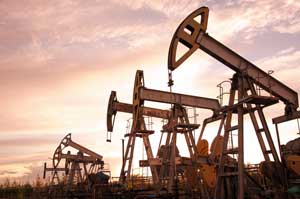The Default Risk of Oil-Producing Countries

Many believe that oil-producing countries don’t hold significant public debt. However, many do, and the default risk of these countries is notably affected by factors related to oil production and price factors. A recent Economic Synopses essay discussed a paper finding that, among other things, more oil reserves actually increased a country’s perceived risk in the long run.
Economist Paulina Restrepo-Echavarria and Senior Research Associate Maria Arias discussed the findings of Restrepo-Echavarria’s working paper “Commodity Prices and Sovereign Default: A New Perspective on the Harberger-Laursen-Metzler Effect.”1 This paper studied how oil reserves, oil production, oil prices and public debt levels relate to sovereign default risk.
Restrepo-Echavarria and Arias noted that the top 25 net oil exporters had average public debts ranging from 8 to 170 percent of gross domestic product (GDP), with an average of about 50 percent, over the period 1979-2010. They also showed that only eight of these same 25 countries had not defaulted over the same time period. (For figures showing the countries and these data, see the essay “Sovereign Default and Economic Performance in Oil-Producing Economies.”)
How Risk Was Affected
Using Institutional Investor Country Credit ratings, the paper showed that larger shares of oil in GDP and higher oil prices reduced the perceived risk of given countries. This was due to higher output and prices allowing the public sector to support higher levels of public debt.
However, higher levels of oil reserves actually increased perceived risk in the long run. Restrepo-Echavarria and Arias wrote: “Although counterintuitive, the authors argue that this finding reflects the fact that a country with a large stock of oil may be able to withdraw from the global financial system more easily, making default more appealing.”
Restrepo-Echavarria and Arias also explained that oil-producing countries tend to increase production during default episodes. They wrote: “This evidence suggests that a country in default and excluded from international financial markets pumps more oil to counter the financial consequences of default.”
Notes and References
1 Co-written with Franz Hamann and Enrique Mendoza. Hamann, Franz; Mendoza, Enrique G.; and Restrepo-Echavarria, Paulina. “Commodity Prices and Sovereign Default: A New Perspective on the Harberger-Laursen-Metzler Effect.” Unpublished manuscript, 2016.
Additional Resources
- Economic Synopses: Sovereign Default and Economic Performance in Oil-Producing Economies
- On the Economy: Oil Prices’ Effect on Employment Growth
- On the Economy: A Link between Oil Prices and Inflation Expectations?
Citation
ldquoThe Default Risk of Oil-Producing Countries,rdquo St. Louis Fed On the Economy, Nov. 1, 2016.
This blog offers commentary, analysis and data from our economists and experts. Views expressed are not necessarily those of the St. Louis Fed or Federal Reserve System.
Email Us
All other blog-related questions

